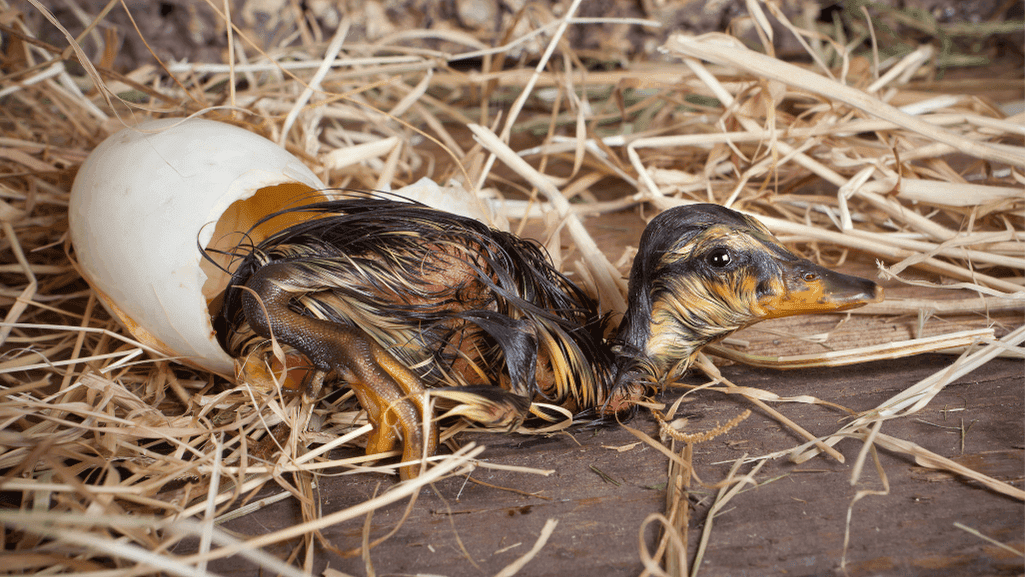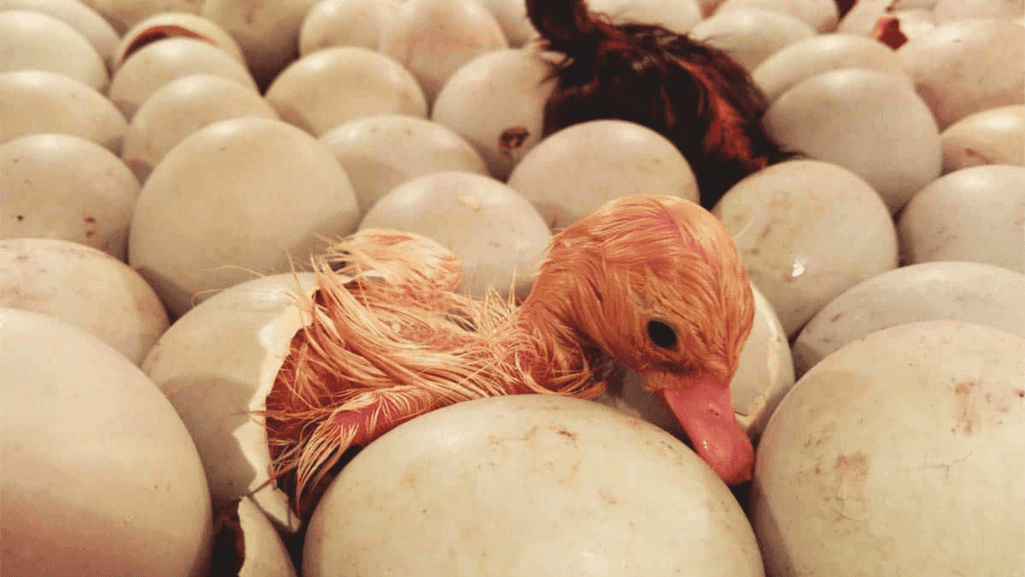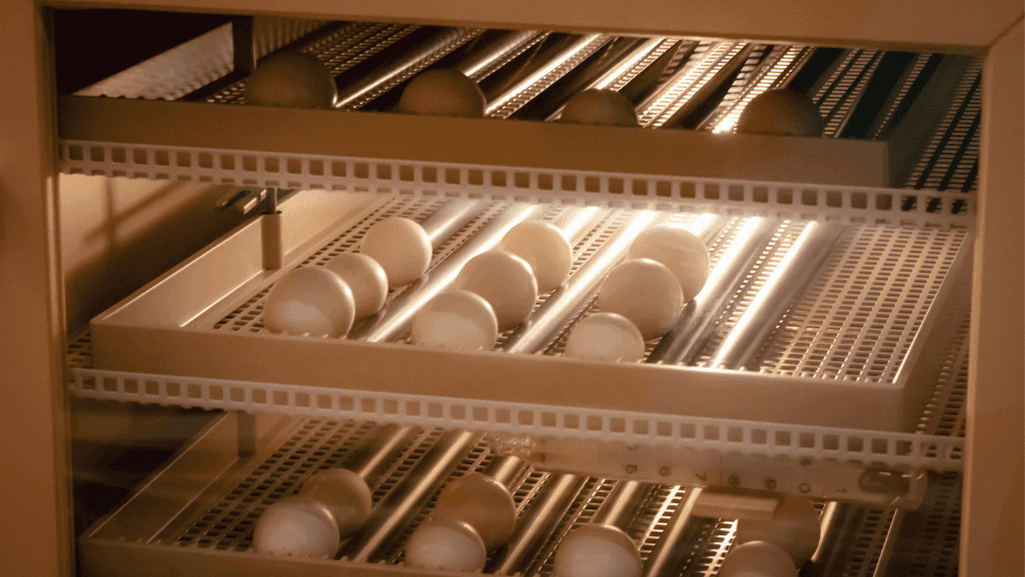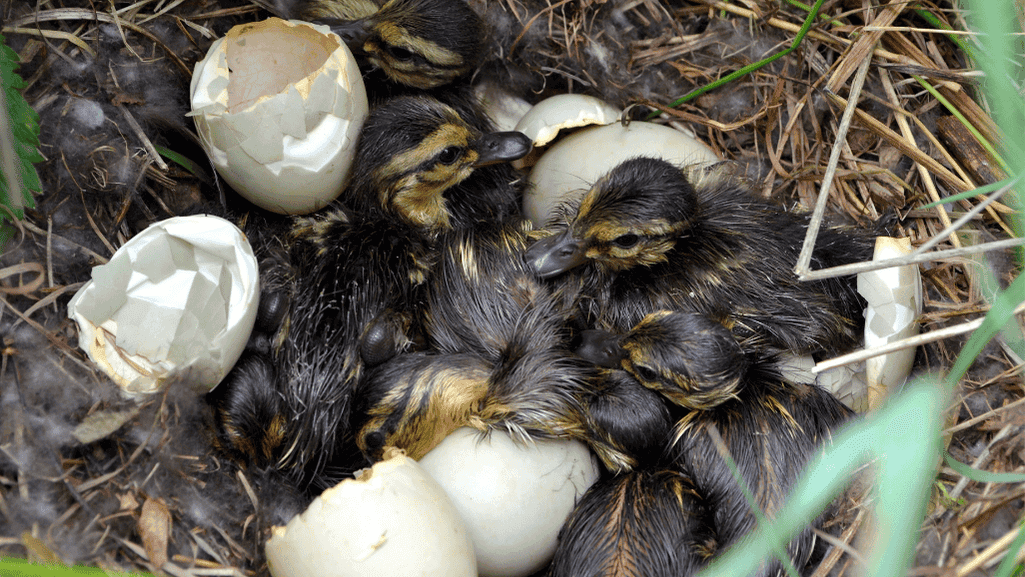If you’re thinking about hatching duck eggs, knowing the duck egg incubation time is key. The average time for duck eggs to hatch is 28 days. But, this can change based on the breed and other factors. In this guide, we’ll look at the duck egg hatching process, including the best incubation conditions, nesting habits, and tips for a successful hatch.
Most duck eggs hatch in 28 days, but some are different. For example, Muscovy duck eggs take about 35 days, and bantam duck eggs hatch in around 26 days. Standard-sized domestic and wild duck breeds usually hatch in 28 days. Hybrids of ducks and Muscovies can hatch in 28-35 days.
To get the best hatching results, duck eggs need a steady temperature of 99.5°F (37.5°C). Humidity should be kept at 55-60% for the first 25 days. Then, increase it to 65-70% on day 25 to prepare for hatching. It’s also important to turn the eggs manually at least four times a day to prevent the embryo from sticking to the shell.
When storing duck eggs for hatching, keep them at room temperature for up to 10 days. The longer they are stored, the lower the hatch rate. Fertile eggs are needed for hatching, so a drake is required to ensure the eggs are fertile. Once the ducklings start pipping their eggs, it’s important not to open the incubator. This can cause a drop in humidity which may hinder proper hatching.
Key Takeaways
- The average duck egg incubation time is 28 days, with some variation by breed.
- Maintain a steady temperature of 99.5°F and humidity levels between 55-70% for successful hatching.
- Turn eggs manually at least four times a day to prevent embryo sticking.
- Store eggs at room temperature for up to 10 days before incubation for the best hatch rate.
- Ensure eggs are fertile by having a drake present in the flock.
- Do not open the incubator once ducklings start pipping to maintain proper humidity levels.
Understanding Duck Eggs and Incubation
Duck eggs are fascinating for both new and experienced poultry fans. Knowing about duck eggs and the best incubation conditions is key for successful duck breeding. Let’s explore what makes duck eggs special.
What Are Duck Eggs?
Duck eggs are bigger than chicken eggs and have a thicker shell. They have rich, creamy yolks and more protein than chicken eggs. The size and color of duck eggs vary by breed.
Types of Ducks and Their Eggs
Most duck breeds come from Mallards and need 28 days to hatch. But, there are some exceptions:
- Muscovy ducks, a unique waterfowl, need 35 days to hatch.
- Bantam duck breeds, like Call ducks and East Indies ducks, hatch in about 26 days.
- Pekin duck eggs are kept in a setter for 25 days before moving to a hatcher. They hatch on the 28th day.
Ducks start laying eggs at 6–7 months old. They reach 90% production in 5 weeks. Pekin ducks lay eggs at 26–28 weeks and can lay about 160 eggs in 40 weeks.
Ideal Conditions for Incubation
Good incubation is key for duck egg development. The best conditions include:
- Keeping the temperature at 99.5°F (37.5°C)
- Humidity of 55-60% (65-70% in the last days)
- Enough air
- Turning eggs 90° at least three times a day manually or every hour with equipment
For storing eggs, keep them at 13°C and 75% humidity.
Keeping eggs for more than 7 days lowers hatching chances. Store eggs pointed down and turn them daily if kept over a week.
Timeline for Duck Egg Hatching
When it comes to duck egg gestation, most eggs incubate for about 28 days. But, the time can change based on the duck breed. For example, Muscovy eggs incubate for about 35 days. Bantam eggs might hatch in just 26 days.
- Temperature fluctuations
- Humidity levels
- Age of the egg when incubation begins
Keeping the temperature around 99.5°F and humidity at 55-58% for the first 25 days is key. In the last days (26-28), increase humidity to 65% or more to help with hatching.
Distinguishing Between Breeds
Distinguishing duck breeds is important for knowing incubation times. Most Mallard breeds, like Pekins and Cayugas, incubate for about 28 days. But, Muscovy and Call ducks have different times. Muscovy eggs need about 35 days, while Call duck eggs hatch in about 26 days.
“Magpie ducks, contrary to popular belief, typically require around 28 days of incubation but may hatch around day 26 in some cases.”
After a duckling pips the egg, it takes about 48 hours to fully hatch. During this time, it absorbs the yolk, which gives it nutrition for the first 48 hours. Knowing these breed-specific times and the factors affecting duck egg hatching is key for successful incubation and hatch rates.
Incubation Methods for Duck Eggs
There are two main ways to hatch duck eggs: natural incubation and artificial incubation. Natural incubation means a broody duck sits on the eggs. This method is easy but not always reliable. Artificial incubation with an incubator gives more control and better results.
Natural vs. Artificial Incubation
Natural incubation uses a broody duck’s instincts. It’s good but might not work for many eggs or consistent results. Artificial incubation with an incubator controls temperature, humidity, and egg turning. These are key for successful hatching.
Best Practices for Incubation
To get the best results, follow these key practices:
- Keep the temperature at 99.5°F (37.5°C) during incubation.
- Humidity should be 55% until the last days, then 65-80%.
- Turn eggs 3-5 times a day until day 25.
- Make sure the incubator has good ventilation.
- Candle eggs at day 7 and 25 to check for development.
Following these practices can greatly improve your hatch rate.
Equipment Needed for Artificial Incubation
For artificial incubation, the right equipment is key. A good incubator is essential, but you’ll also need:
- An accurate thermometer for temperature checks.
- A hygrometer for humidity levels.
- An automatic egg turner for consistent turning.
- A candling lamp or flashlight for egg checks.
Quality equipment is vital for successful hatching. For a unique choice, consider crested ducks. They have a distinctive crest due to a genetic mutation.
Signs of Duck Eggs Hatching
As the hatching day gets closer, keep a close eye on your duck eggs. Look for physical changes and listen for sounds inside. These signs will tell you when your ducklings are ready to come out.
Physical Changes in Eggs
Days 26-28 are when you’ll see big changes in the eggs. The air cell at the egg’s big end will grow. The shell might look more porous. These signs mean the duckling is getting ready to hatch.
Sounds to Look For
When the duckling starts to pip, you’ll hear faint peeping. This is a clear sign hatching has started. The peeping will get louder and more frequent as the duckling breaks free.
Monitoring Hatch Progress
When eggs start showing hatching signs, keep the incubator quiet. Opening it can mess with humidity levels. This can hurt the hatching process. Watch through the incubator window instead. Hatching can take 24 to 36 hours or more, so be patient.
“Watching duck eggs hatch is an incredible experience. It’s amazing to witness the transformation from egg to duckling and see the little ones take their first steps into the world.”
By watching for physical changes, listening for peeping, and keeping quiet during hatching, you help your ducklings hatch well. Seeing healthy, happy ducklings is a joy worth all the care and patience.
Post-Hatching Care for Ducklings
After the exciting 28-35 day incubation period, caring for newly hatched ducklings is key. Once they emerge from their shells, let them dry off in the incubator. This step is important for their health.
Immediate Needs After Hatching
When setting up a duckling brooder, a warm, safe space is essential. Start with a heat source at 90°F (32°C). Then, lower the temperature by 5°F each week until they’re fully feathered.
Baby ducklings don’t need to eat or drink for the first 48 hours. They get nutrients from the yolk sac during this time.
Creating a Safe Environment
To ensure a secure space, the brooder should have a non-slip floor. Also, provide a shallow water dish to prevent drowning. Ducklings are curious and active, so keep the brooder free from hazards.
As they grow, increase the brooder’s size. This gives them room to move and explore.
Feeding and Nutrition for Ducklings
After the first 48 hours, ducklings are ready to eat and drink. Provide a balanced starter feed made for ducklings. This feed supports their growth and development.
Offer the feed in a shallow dish or tray. Keep the water clean and fresh, changing it often. A proper diet and a safe, warm environment help ducklings thrive and grow into healthy adult ducks.











